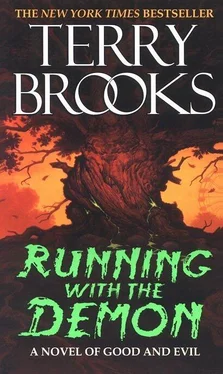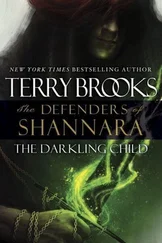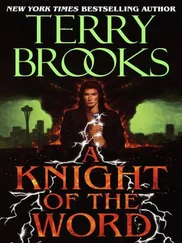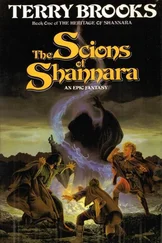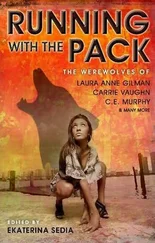"He can't see them," her grandmother told her finally. "There's no point talking about it with him, Nest. He just doesn't see them."
"Why doesn't he?" she had asked, mystified.
"Because most people don't. Most people don't even know they exist. Only a lucky few can see them." She leaned close and touched the tip of Nest's small nose. "You and me, we can. But not Robert. Not your grandfather. He can't see them at all."
She hadn't said why that was. Her explanations were always like that, spare and laconic. She hadn't time for a lot of words, except when she was reading, which she did a lot. On her feet she was all movement and little talk, losing herself in her household tasks or her gardening or her walks in the park. That was then, of course. It wasn't the same anymore, because now Gran was older and drank more and didn't move around much at all. Small, gnarled, and gray, she sat at the kitchen table smoking her cigarettes and drinking her vodka and orange juice until noon and, afterward, her bourbon on the rocks until dusk. She still didn't say much, even when she could have, keeping what she knew to herself, keeping her explanations and her secrets carefully tucked away somewhere deep inside.
She told Nest early on not to talk about the feeders. She was quite emphatic about it. She did so about the same time she told the little girl that only the two of them could see the feeders, so there wasn't any point in discussing them with her grandfather. Or with anybody else, she amended soon after, apparently concerned that the increasingly talkative child might think to do so.
"It will just make people wonder about you," she declared. "It will make them think you are a bit strange. Because you can see the feeders and they can't. Think of the feeders as a secret that only you and I know about. Can you do that, Nest?"
Pretty much, she found she could. But the lack of a more thorough explanation on the matter was troubling and frustrating, and eventually Nest tested her grandmother's theory about other people's attitudes on a couple of her friends. The results were exactly as her grandmother had predicted. Her friends first teased her and then ran to their parents with the tale. Their parents called her grandmother, and her grandmother was forced to allay their concerns with an overly convoluted explanation centered around the effects of fairy tales and make–believe on a child's imagination. Nest was very thoroughly dressed down. She was made to go back to her friends and their parents and to apologize for scaring them. She was five years old when that happened. It was the last time she told anyone about the feeders.
Of course, that was just the first of a number of secrets she learned to conceal about the creatures who lived in the park. Don't talk about the feeders, her grandmother had warned, and in the end she did not. But there were a lot of other things she couldn't talk about either, and for a while it seemed there was something new every time she turned around.
"Do you think the feeders would ever hurt me, Gran?" she asked once, disturbed by something she had seen in one of her picture books that reminded her of the furtiveness of their movements in the shadows of summer twilight and the dismal gloom of midday whiter. "If they had the chance, I mean?"
They were alone, sitting at the kitchen table playing dominoes on a cold midwinter Sunday, her grandfather ensconced in his den, listening to a debate over foreign aid.
Her grandmother looked up at her, her bright, darkly luminescent bird's eyes fixed and staring. "If they had the chance, yes. But that will never happen."
Nest frowned. "Why not?"
"Because you are my granddaughter."
Nest frowned some more. "What difference does that make?"
"All the difference" was the reply. "You and I have magic, Nest. Didn't you know?"
"Magic?" Nest had breathed the word in disbelief. "Why? Why do we have magic, Gran?"
Her grandmother smiled secretively. "We just do, child. But you can't tell anyone. You have to keep it to yourself."
"Why?"
"You know why. Now, go on, it's your turn, make your play. Don't talk about it anymore."
That was the end of the matter as far as her grandmother was concerned, and she didn't mention it again. Nest tried to bring it up once or twice, but her grandmother always made light of, the matter, as if having magic was nothing, as if it were the same as being brown–eyed or right–handed. She never explained what she meant by it, and she never provided any evidence that it was so. Nest thought she was making it up, the same way she made up fairy tales now and then to amuse the little girl. She was doing it to keep Nest from worrying about the feeders. Magic, indeed, Nest would think, then point her fingers at the wall and try unsuccessfully to make something happen.
But then she discovered Wraith, and the subject of magic suddenly took on a whole new meaning. It was when she was still five, shortly after her attempt at telling her friends about the feeders and almost a year before she met Pick. She was playing in her backyard on the swing set, pretending at flying as she rose and fell at the end of the creaking chains, comfortably settled in the cradle of the broad canvas strap. It was a late–spring day, the air cool yet with winter's fading breath, the grass new and dappled with jack–in–the–pulpit and bleeding heart, the leaves on the oaks and elms beginning to bud. Heavy clouds scudded across the Midwest skies, bringing rain out of the western plains, and the sunlight was pale and thin. Her grandparents were busy inside, and since she was forbidden to leave the yard without them and had never done so before, there was no reason for them to believe she would do so now.
But she did. She got down out of the swing and walked to the end of the yard where the hedgerow was still thin with new growth, slipped through a gap in the intertwined limbs, and stepped onto forbidden ground. She didn't know exactly what it was that prompted her to do so. It had something to do with thinking about the feeders, with picturing them as they appeared and faded in shadowy patches along the fringes of her yard. She wondered about them constantly, and on this day she simply decided to have a look. Did they conceal themselves on the other side of the hedge, just beyond her view? Did they burrow into the ground like moles? What did they do back there where she couldn't see? Why, her inquisitive five–year–old mind demanded, shouldn't she try to find out?
So there she was, standing at the edge of the park, staring out across the broad, flat, grassy expanse of ball diamonds and picnic grounds to where the bluffs rose south and the wooded stretches began east, a pioneer set to explore a wondrous new world. Not that day, perhaps, for she knew she would not be going far on her first try. But soon, she promised herself. Soon.
Her eyes shifted then, and she became aware of the feeders. They were crouched within a copse of heavy brush that screened the Peterson backyard some fifty feet away, watching her. She saw them as you would a gathering of shadows on a gray day, indistinct and nebulous. She caught a glimpse of their flat, yellow eyes shining out of the darkness like a cat's. She stood where she was, looking back, trying to see them more clearly, trying to determine better what they were. She stared intently, losing track of time as she did so, forgetting where she was and what she was about, mesmerized.
Then a drop of rain fell squarely on her nose, cold and wet against her skin. She blinked in surprise, and suddenly the feeders were all around her, and she was so terrified that she could feel her fear writhing inside her like a living thing.
And, just as suddenly, they were gone again. It happened so fast that she wasn't sure if it was real or if she had imagined it. In the blink of an eye, they had appeared. In another blink, they had gone. How could they move so quickly? What would make them do so?
Читать дальше
